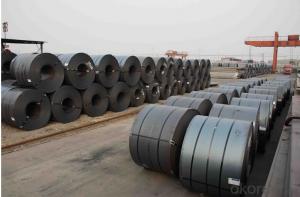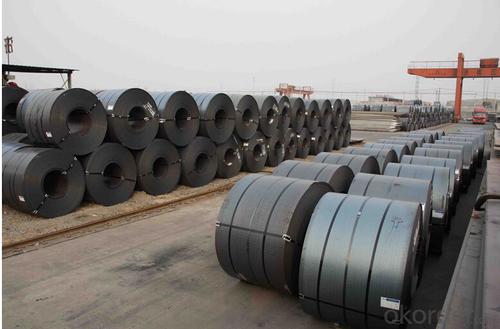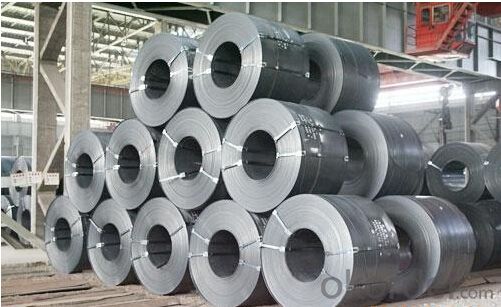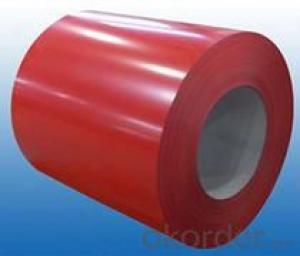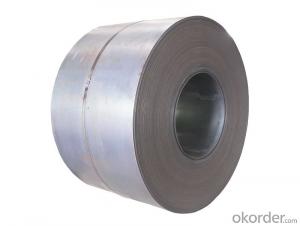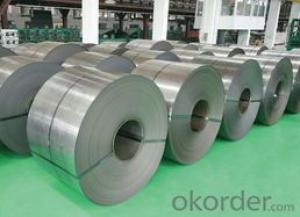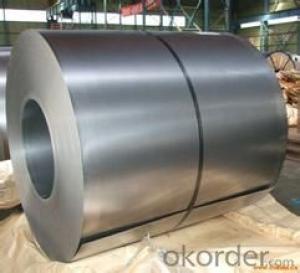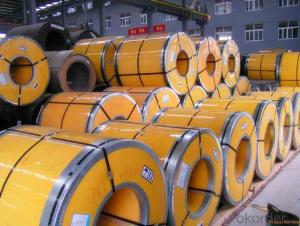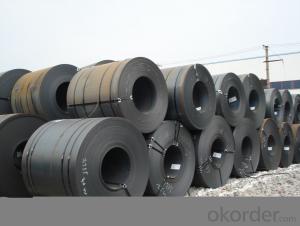HOT ROLLED STEEL COIL
- Loading Port:
- China Main Port
- Payment Terms:
- TT OR LC
- Min Order Qty:
- -
- Supply Capability:
- -
OKorder Service Pledge
OKorder Financial Service
You Might Also Like
Production | hot rolled steel coils |
Port | Tianjin, China |
Category | Minerals & metallurgy |
Thickness | 1.8-16mm |
Width | 1000-1500mm |
Coil Weight | about 23 tons |
Material Grade | SS400\Q235\Q345B |
Technique | hot rolled |
Standard | GB ,JIS |
Test | With Hydraulic Testing, Eddy Current , Infrared Test |
Surface | 1) Bared 2) Black Painted (varnish coating) 3) Galvanized 4) Oiled |
Package | in bundles, strapped by strips. Or as customer’s requirement |
Sample | Common products, we can provide freely, for special production,we can depends on negotiation. |
MOQ | 10 tons |
Payment | 100% L/C at sight, 30% T/T in advance, and the balance against the copy of B/L or negotiation |
Delivery time | Within 10-25 days, according to quantity, asap save customer’s time |
Certificate | ISO |
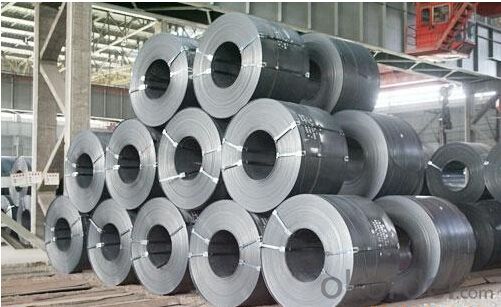
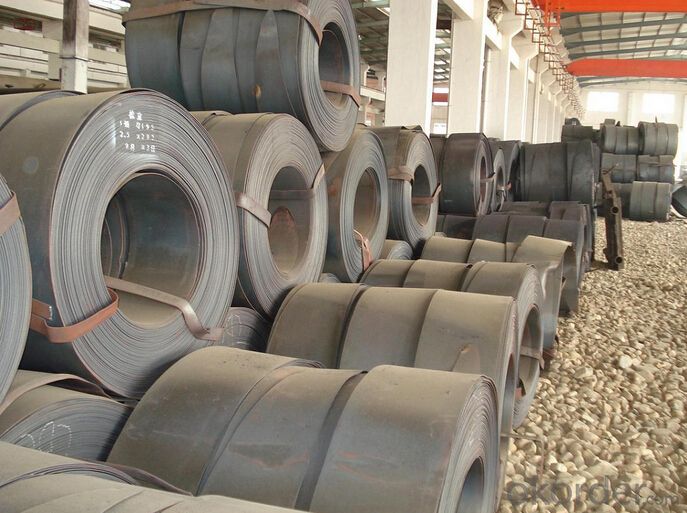
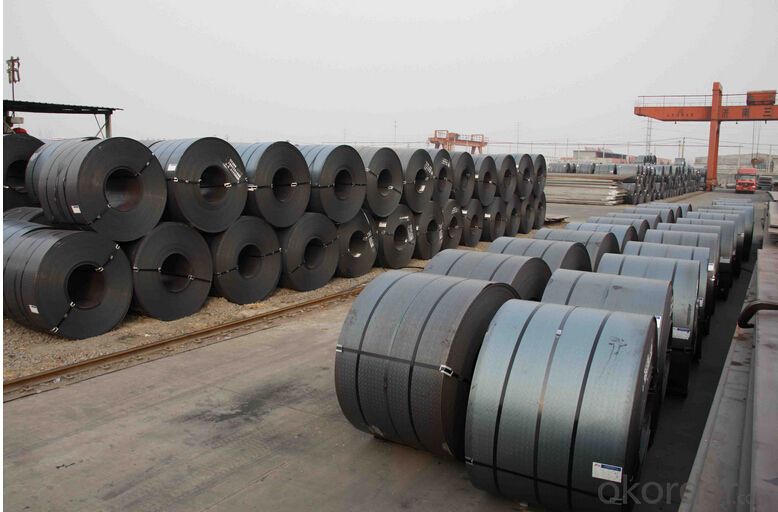
- Q: What is the weight of a standard steel coil?
- The weight of a standard steel coil can vary, but on average, it ranges from 10 to 20 tons.
- Q: i have purchased a high dollar Martin guitar and i was wondering if there are many people out there that have used steel string acoustics for classical and flamenco guitar playing.otherwise i will need a nylon stringeror.. uld i put nylon strings on an old yamaha steel string guitar that i have?
- If the guitar was designed for nylon strings, then don't put steel strings on it!
- Q: what is magnetic steel used for and if it can be used for producing kitchenwares utenils like stainless steel basines,mugs and bowls.
- Magnetic steel rusts. That's why kitchenware is often made out of stainless. You can't turn magnetic steel into stainless, sorry. Metalurgy is a complicated subject, and is all about different alloys. It's far too involved to explain in a few paragraphs here, but no, they're not interchangeable in this case unless you want to produce kitchenware that rusts.
- Q: How are steel coils used in the manufacturing of automotive springs?
- Steel coils are used in the manufacturing of automotive springs as they provide the necessary strength and flexibility required for suspension systems. These coils are shaped, heated, and tempered to achieve the desired spring rate and durability, ensuring a smooth and controlled ride for vehicles.
- Q: What is the role of steel coils in the production of fencing materials?
- Steel coils play a crucial role in the production of fencing materials as they serve as the primary raw material for manufacturing wire mesh used in fences. These coils are unrolled and processed by machines to create the required gauge and size of wire. The wire is then woven or welded to form the fencing mesh, providing strength, durability, and security to the final product.
- Q: and what are the four main elements in STAINLESS steel? x
- decreasing the carbon content fabric will strengthen the ductility, which will make it greater versatile. Carbon in metallic varieties brittle cementite (iron carbide) which will strengthen the hardness and capability of metallic.
- Q: For example, (and this is weird) if I were wearing a steel collar and I needed some way to remove it, with limited supplies.Force is difficult because it would be around my neck.Chemical cominations are great- but they have to use VERY common products. And I'm not sure what to use.Other ideas?
- Your best bet would be a grinding wheel attached to a small electric motor. Even if you slipped, your skin is too soft to be cut by the dull wheel. Steel, however, is easily cut. But perhaps you don't have access to electricity or pressurized air to run such a tool. In that case, a simple file would work well, though you'd be somewhat more likely to injure yourself. If you had no tools, but access to whatever chemicals you wanted, you could try a weak acid. This would take a long time, and require constant scrubbing to bring fresh acid into the pits in the metal, but it would eventually eat through the collar.
- Q: I have a set of steel pans with copper bottoms. When I cook with oil it always burns the oil to the pan and takes days to clean. I don't think I should use steel wool, since it might scratch the surface. Does anyone know a faster way to clean scorched oil off a steel pan?
- Get a can of Barkeeper's Friend. It's a powdered cleanser. It's gentle enough to be used on a ceramic cook top but still strong enough to get metal clean. Cheap and made from rhubarb leaves! Dampen the pan with water, sprinkle generously and smear around with a sponge with one of those non-stick safe nylon scrub pads. Wait about 10-15 minutes to let the product do some of the work for you. Come back and give it a good scrub. Reapply if necessary. I have all stainless steel cookware and use the Barkeeper's to keep them looking nice; especially since they are on display with my pot rack. I also have some copper pieces used for decoration and I use the Barkeeper's to keep them looking nice. It cleans them up faster and better than any of the homemade concoctions or metal cleaners without the residue. And I do use it on my ceramic cook top too! Be sure to wash and rinse the pan after you get it clean; it does leave a haze if you don't.
- Q: Search the internet for 'Frost Clipper Knife'. This knife comes in either stainless or carbon steel. I have a friend who has one (stainless steel) and he is very impressed with it, but I have heard that Carbon Steel blades are better? Discuss...
- If your talking about a folding pocket knife, I think that it's basically six one way and a half dozen the other. I actually do prefer stainless for my pocket knives. I don't want to oil a knife to the degree I feel carbon requires, only to then stick it my pocket to attract dirt to the knife and oil to my pants. I'm the exact opposite on sheath knives though. I like 1095 carbon steel, plain edge sheath knives. I'll thrash on them HARD, and I rarely have major edge problems. Of course, I require them to be coated with some kind of powder coat or the like, because they can rust, but I do try and keep them clean and dry when in the sheath, so they won't pit the uncoated edge. My reasons for this sheath knife preference is multi-fold. First, these knives are simply affordable. I don't spend $80 dollars on a outdoors sheath knife. I use the tool too hard to want to spend more. I don't like the more traditional stainless steels such as AUS-8, 420HC, and 440C (not to mention the HORRENDOUS 440A) because I feel that the all else being equal, a stainless blade will bend before a carbon blade will break. I also think that carbon holds an edge at least as well, if not better, than traditional stainless, and it's much easier to hone. I don't know much about these new laminates, other than the very hard, but not so tough. They seem to be POSSIBLY too brittle for my use. That, combined with the fact that they cost a FORTUNE, means that I just won't be considering them.
- Q: How do steel coils contribute to the construction equipment industry?
- Steel coils play a crucial role in the construction equipment industry by providing the necessary raw material for manufacturing various construction machinery and equipment. These coils, made from high-quality steel, are used in the fabrication of a wide range of construction equipment, such as cranes, bulldozers, excavators, loaders, and forklifts. The primary contribution of steel coils to the construction equipment industry lies in their structural strength and durability. Steel is known for its excellent mechanical properties, including high tensile strength, toughness, and resistance to wear and corrosion. These qualities make it an ideal material for constructing heavy-duty machinery that can withstand the demanding conditions of construction sites. Steel coils are used to manufacture the structural components of construction equipment, such as chassis, frames, booms, buckets, and attachments. These components need to be robust and able to withstand heavy loads, impacts, and constant use. Steel coils provide the necessary strength and reliability to ensure the longevity and performance of construction equipment. Furthermore, steel coils are also used to fabricate specialized parts and accessories for construction machinery. These include hydraulic systems, gears, shafts, bearings, and fasteners. These components are crucial for the proper functioning and efficiency of construction equipment, and steel coils provide the high-quality material needed to manufacture them. In addition to their mechanical properties, steel coils also contribute to the construction equipment industry through their versatility and customization options. Steel can be easily shaped, cut, welded, and formed into various shapes and sizes, allowing manufacturers to create equipment with specific designs and functionalities to meet the diverse needs of construction projects. Overall, steel coils are indispensable in the construction equipment industry as they provide the foundation for robust and reliable machinery. Their strength, durability, and versatility make them an essential raw material for manufacturing construction equipment that can withstand the rigors of the construction site and ensure the safety and efficiency of construction projects.
Send your message to us
HOT ROLLED STEEL COIL
- Loading Port:
- China Main Port
- Payment Terms:
- TT OR LC
- Min Order Qty:
- -
- Supply Capability:
- -
OKorder Service Pledge
OKorder Financial Service
Similar products
Hot products
Hot Searches
Related keywords
